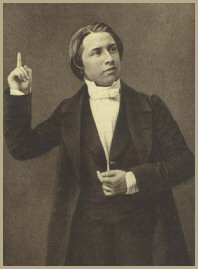 On January 7, 1855, the minister of New Park Street Chapel, Southwark, England, opened his morning sermon with the following statement:
On January 7, 1855, the minister of New Park Street Chapel, Southwark, England, opened his morning sermon with the following statement:
It has been said by someone that “the proper study of mankind is man.” I will not oppose the idea, but I believe it is equally true that the proper study of God’s elect is God; the proper study of a Christian is the Godhead. The highest science, the loftiest speculation, the mightiest philosophy, which can ever engage the attention of a child of God, is the name, the nature, the person, the work, the doings, and the existence of the great God whom he calls his Father.
There is something exceedingly improving to the mind in a contemplation of the Divinity. It is a subject so vast, that all our thoughts are lost in it’s immensity; so deep, that our pride is drowned in its infinity. Other subjects we can compass and grapple with; in them we feel a kind of self-content, and go our way with the thought, “Behold, I am wise.” But when we come to this master science, finding that our plumbline cannot sound its depth, and that our eagle eye cannot see its height, we turn away with the thought that vain man would be wise, but he is like a wild ass’s colt; and with solemn exclamation, “I am but of yesterday, and know nothing.” No subject of contemplation will tend more to humble the mind, than thoughts of God…
But while the subject humbles the mind, it also expands it. He who often thinks of God, will have a larger mind than the man who simply plods around this narrow globe… The most excellent study for expanding the soul, is the science of Christ, and Him crucified, and the knowledge of the Godhead in the glorious Trinity. Nothing will so enlarge the intellect, nothing so magnify the whole soul of man, as a devout, earnest, continued investigation of the great subject of the Deity.
And, whilst humbling and expanding, the subject is eminently consolatory. Oh, there is, in contemplating Christ, a balm for every wound; in musing on the Father, there is a quietus for every grief; and in the influence of the Holy Ghost, there is a balsam for every sore. Would you lose your sorrow? Would you drown your cares? Then go, plunge yourself in the Godhead’s deepest sea; be lost in his immensity; and you shall come forth as from a couch of rest, refreshed and invigorated. I know nothing which can so comfort the soul; so calm the swelling billows of sorrow and grief; so speak peace to the winds of trial, as a devout musing upon the subject of the Godhead. It is to that subject that I invite you this morning…
-Charles Haddon Spurgeon (at that time, 20 years old)
I love this quote. I really do. It is one of the quotes which started me on the journey of learning theology.
And I’m sorry, nobody holds a candle to the way that C. H. Spurgeon could preach. If you have never read any of his sermons, you are missing out. Find a few online, go into an empty room of your house, and read it — out loud. When I was a pastor, I used to do that in my study to “prime the pump” for my own sermon preparation.
But here is my question: Spurgeon states a few times in this quote that theology is a science. He calls it the “highest science,” the “master science,” the “science of Christ.”

Is it really a science? When I think of “science” I think of organizing, categorizing, dissecting, compartmentalizing, listing, outlining, and structuring. And as we saw in our theological definitions, this is indeed how most people approach theology. God and the Bible are subjects to be studied, organized, and categorized.
While such a practice may be helpful in certain respects, is it wise?
Those of you who are married, how would you have liked it if, on the day of your wedding, your spouse treated you like a science project? If, instead of spending time loving you, they organized and listed your attributes and characteristics on paper in an orderly, bullet-point fashion?
And yet this is what lots of theology has done with God. We think we know Him because we have categorized, systematized, and organized everything that we have learned about him in neat little outlines and charts.
If I were God, I think maybe I would be offended when humans try to scientifically “summarize” me on a piece of paper.
Can God be summarized like a dissected frog?
To ask the question is to answer it.
Theology must never take the place of a living, vibrant, loving, genuine relationship with God. If we don’t have that relationship, theology is worthless. If we begin to lose that relationship, the pursuit of theology must be abandoned.
Maybe theology should be called theolovy. Then it would no longer be the science of knowing God, but the life of loving God.




owww.i absolutely love this post!!
Yes..if we could ever understand all the mysteries of God, then He wouldnt be God anymore would He? But praise be to God for revealing little by little his mysteries to mere creatures like us
yes, a little bit at a time is best. And I’m glad he is patient with us as we struggle to understand even the little bit He reveals.
Jeremy,
This is a great point. The World is art, as is the Word. Confronted with a Rembrandt, scientific inquiry can test the canvas, validate the titanium content in the white paint, all that, but it cannot bring a person to the point of grasping the painting as a work of art.
Nonetheless, appreciating art and loving the Artist is a rule-governed endeavor that can be cultivated; there is an art to it, certainly, but there is also a craft. Learning the craft creates the container in which the art — if God grants — will grow. I think the mistake of the ‘theology as science’ types is thinking the craft is all there is, and that which can’t be validated in terms of the craft isn’t real. They couldn’t be more wrong.
Tim,
You are a real artist of theology. I like the directions your thinking and writing is taking you. I am hoping to learn more from you, my friend!
If only!
God’s given me a gift with words. What I can see, I can say well. There are many, many better theologians than I — men and women who see God far more clearly, and shine forth His likeness far more readily. They may not be able to say their knowledge of God, but they simply embody it instead — which always was the point.
Tim,
You are too hard on yourself. There may be better theologians, but in your specialties, there are few better.
I wish youtube or podcasts existed when Spurgeon was preaching. I bet he tore the house down.
I also think part of the problem with examining God like a science project, is that we tend to view him through our our own lenses. We read scripture searching for attributes and end up interpreting things out of context often as we search for data points to or against our hypothesis of God.
The relationship is key.
Oh, so do I!
A while back I found a guy who was selling “Spurgeon Sermon Audio.” I thought, “Wow! How did they get this!?” So I got a few.
It was just this guy reading Spurgeon’s sermons….
Spurgeon was a great preacher. Can you believe he was only 20 when he wrote that sermon? I’d love to hear him preach.
But you’re right. Theology is worthless without relationship, relationship with God and people. Without relationship theology is meaningless, empty words (the condition of much religion).
I was about 20 when I first read this quote. I despaired that he was saying things like this at the same age I was when I read it.
It may be that at the time Spurgeon preached ” science was regarded as the apogee of epistemology and Spurgeon was metaphorical not literal,..you knew that,…the queen of sciences theology is more an art,…in music a dependency on harmonic mathmatics starting with being in tune is essential but it remains an art not a science,…so i agree with Tim. When asked ( by a student) is this music good? I ask did they weep? Mankind= scientific giants, moral midgets, Spurgeon=moral giant in the preachers art,…
Jeremy,
I absolutely love this post. So many times we try to reduce God to a formula. One of my favorite books is Job, and I really think that this is the whole point of that book. Job and his friends all thought they had God figured out, they even thought they could control the way God acted by how they acted. God comes in for the final few chapters and totally blows their theology out of the water. God makes it clear that there is no science that can fully explain Him or theology that can fully contain Him.
I understand that there is some “scientific” method involved in trying to understand God, but when we only engage Him as a science, we miss out on so much of who He is. Thank you for this reminder.
FedEx,
President,
Men of Praise Ministries
Thanks. None of us (I hope) would approach our spouses or our children with the scientific method as a way to love them. But we do it with God all the time!
Does this picture belong to you and if it does could I use it? 🙂
Science and theology is an interesting idea when generally science was mans attempt to disprove the existance of God.In the early days science and faith worked hand in hand scientists like like issac newton the discoverer of gravity believed that the two were not neccesarily opposed.It was around the time of darwinism that science lost its way faith was seen as ignorance compared with science it wasnt enough to just believe it had to be proven to be true to be observed to be measured and experiments needed to be to be replicated to prove that the theory was correct.. So in the context of disbelief how can one truly understand the depth and breadth and height of our creator its like trying to put together a jig saw puzzle with missing pieces. The arguement of course is that the more we understand the universe the more we realise that it could not have been accidental so to me that is science enough to prove that a designer or creator exists I believe alot more scientists are starting to realise that .brentnz
Thank you so much.